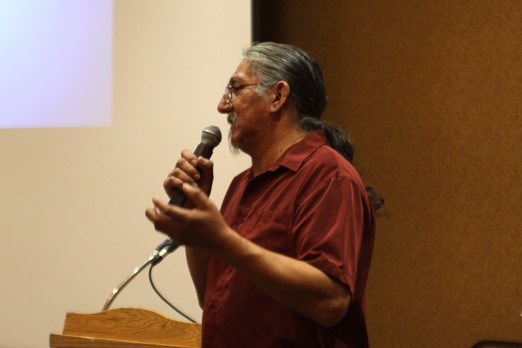When Sam Achneepineskum’s children were growing up he was angry.
He yelled all the time. He abused alcohol.
"That’s how they knew me," Achneepineskum said of his children, now in their 30s. And because of the sexual abuse he suffered in a residential school, he was afraid to hug them.
"It was very hard to hold my children when they were young," he said.
Achneepineskum, Nishnawbe Aski Nation’s residential schools project co-ordinator, was speaking Thursday morning as part of the Truth and Reconciliation Commission at the Travelodge Airlane Hotel. The commission will be in Thunder Bay for three days as it attempts to complete its mandate of learning the truth about what happened at residential schools and inform all Canadians about what happened.
Achneepineskum shared his story of the abuse he suffered and witnessed during his time in three different residential schools. He also spoke about the overall impact the schools had on his community of Marten Falls.
Achneepineskum said he hopes to hear 60-to-80 survivors each day tell their stories over the next three days. Survivors can come and give their testimony, in a public or private setting, as part of the public record.
"It’s to give people an opportunity tell their stories and also to be able to let the general public know about things that happened in residential schools the experiences had," he said. "There are still a lot of people out there that don’t know that residential schools existed."
It’s also a way for survivors to validate their experiences, Achneepineskum said.
"One of the things that we hear a lot when survivors tell their stories when we got it together is that they feel they were the only ones these experiences happened to," said Achneepineskum.
TRC regional liaisons manager Alvin Fiddler said the event is part of the agreement between First Nations and the federal government. Fiddler said once the TRC mandate expires in four years, the survivor testimonies will become part of a research centre.
"We’re hoping it will be a living legacy. It won’t just be material housed somewhere in a warehouse, it will be used by all Canadians in education and public education and research,’ he said. "So that all Canadians know about what happened in these residential schools."
Once people share their story, Fiddler said there are support systems from clinical to spiritual to help them. Fiddler said as more survivors learn about the testimonial process and become familiar with it they are more comfortable talking about their experiences.
"A lot of these survivors, especially the ones that are getting up there in age, they’ve waited a long time to tell their story," he said. "The day is finally here…for many of them it’s the first time that they’ve shared it with their families, with their communities so in that sense its you now maybe a relief to finally share that."
Sign in or register
- Messages
- Post a Listing
- Your Listings
- Your Profile
- Your Subscriptions
- Your Likes
- Your Business
- Support Local News
- Payment History
Registered Users
Already have an account?
New Users
Create a free account.
